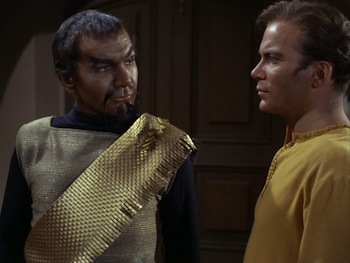“Errand of Mercy”
Written by Gene L. Coon
Directed by John Newland
Season 1, Episode 27
Production episode 6149-27
Original air date: March 23, 1967
Stardate: 3198.4
Captain’s log. The Enterprise has received word that negotiations between the Federation and the Klingon Empire have broken down. A surprise attack is expected. Kirk has been ordered to go to Organia—the only Class-M planet in the disputed area between the nations—to keep the Klingons from using it as a base. En route, the Enterprise is ambushed by a Klingon ship, but they are able to destroy it. Right after that, Uhura gets a Code 1 message from Starfleet Command: it’s war.
When they arrive at Organia, Uhura relays a report that there’s a Klingon fleet in the sector. Kirk and Spock beam down, with the captain leaving Sulu in charge. If the Klingon fleet shows up, Sulu’s orders are to evaluate the situation, and abandon Organia to join the fleet.
The Organians are pretty blasé about two guys beaming down out of nowhere. They are greeted by Ayelbourne, one of the Council of Elders. While Spock checks out the village, Kirk speaks to the council, offering them protection from the Klingons. The Organians, however, have no interest in being protected. Kirk’s stories of slave labor camps and the military dictatorship of the Klingon Empire destroying their way of life fall on deaf ears. Spock also reports that the Organian culture is stagnant, and unchanged for tens of thousands of years.
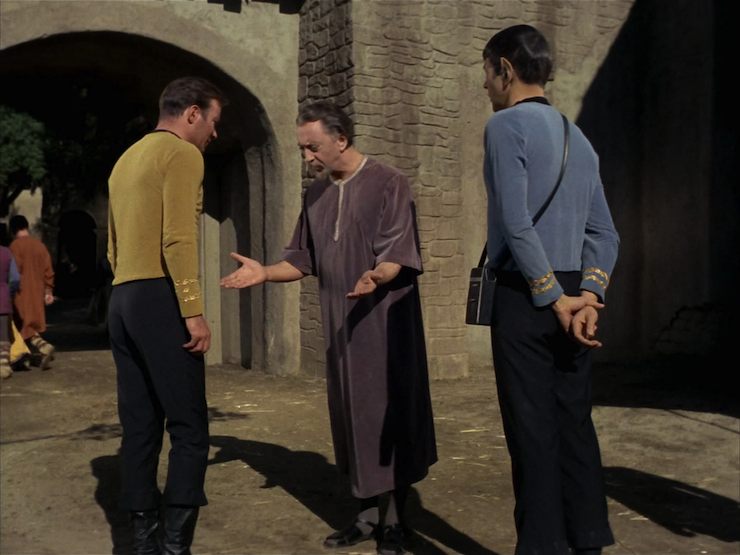
A Klingon fleet shows up in orbit. Sulu retreats on Kirk’s order, and the Organians offer to protect Kirk and Spock from the occupation force that beams down by giving them native clothing (and also confiscating their weapons). The Klingon commander, Kor, enters the council chambers, introducing himself as the military governor of Organia. Kirk identifies himself as Baroner, and Kor notices that “Baroner” is the only Organian who doesn’t smile like an idiot. Spock claims to be a trader in kevas and trillium. Kor orders him taken away for interrogation, as he might be a spy. Kor chooses Kirk to be the liaison between the occupying government and the civil population, as he finds his “good, honest hatred” to be refreshing. The Organians themselves are completely cooperative with Kor’s demands.
Spock is interrogated using the Klingon mind scanner, and while his telepathic discipline enables him to maintain the fiction of his disguise, it is a close call. Kirk would not be so lucky if he was to be subjected to it.
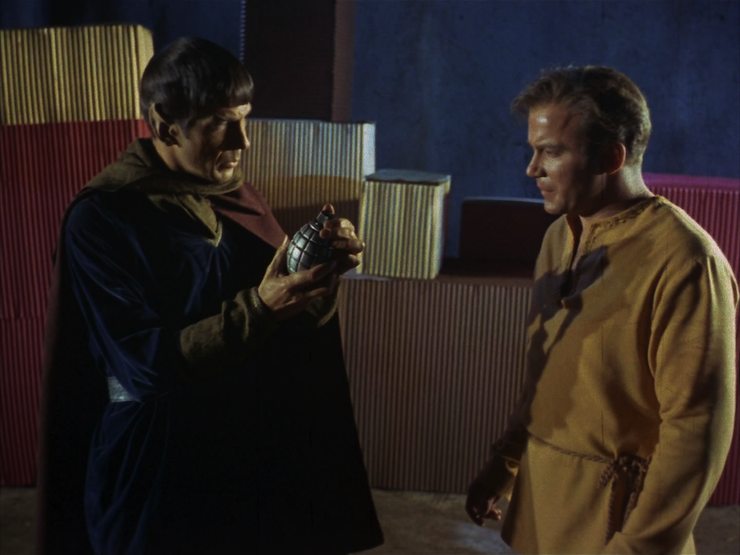
Kirk and Spock blow up a munitions dump. Ayelbourne and the rest of the council are aghast at their violent act. Kor has the council chambers under surveillance, so he knows who blew up the munitions dump, and puts Kirk and Spock under arrest. Rather than let Kirk be subjected to the mind scanner, Ayelbourne tells Kor who Kirk really is. Kor is thrilled that he has captured a starship captain, though he’d been hoping to meet Kirk in battle, not like this.
Kor shares a drink with Kirk and they talk for a bit, then Kor has him put in a cell alongside Spock. They are still determined to carry out their mission, even though the Organians themselves don’t seem to give a rip.
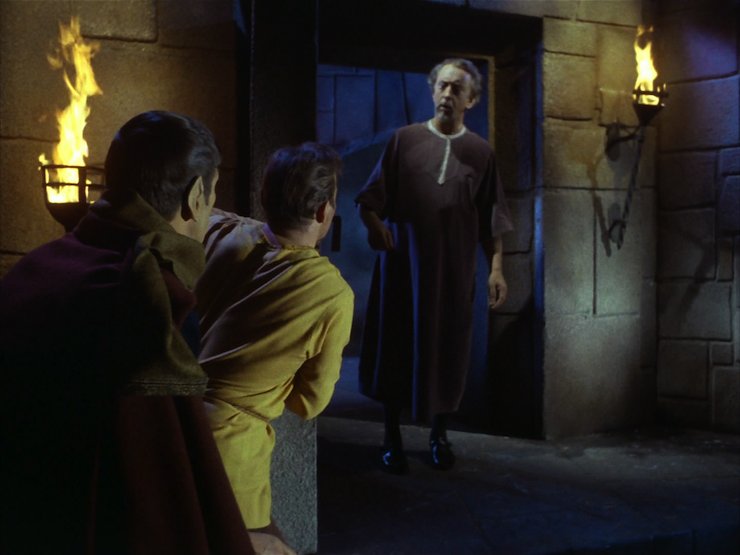
Then Ayelbourne frees them from the cell. Kirk is confused, especially since Ayelbourne betrayed them to the Klingons in the first place. Upon learning that they’ve escaped, Kor orders two hundred Organians killed. Ayelbourne and the others are completely unconcerned about this. However, they reluctantly give Kirk and Spock their phasers back, just to get them off their backs. The pair break into the citadel, taking down several of Kor’s people, and eventually breaking into Kor’s office and taking him prisoner. Kor is fairly philosophical about being captured. There’s a Federation fleet en route to engage the Klingon fleet in space.
Just as Kor’s guards burst in, everyone’s weapons become too hot to touch. In space, the same thing happens on the Enterprise, as all the ship’s instruments become untouchable. Ayelbourne and Claymore enter and explain that it’s their doing. They have rendered both fleets inoperative and insisted that they stop the violence or the fleets will remain paralyzed. Kor and Kirk are outraged, saying that they have no business interfering in interstellar matters, but Ayelbourne points out to Kirk that what he is defending is the right to wage war. Even as he speaks to Kirk and Kor, Ayelbourne is also on Earth and Qo’noS, insisting that they stop the war.
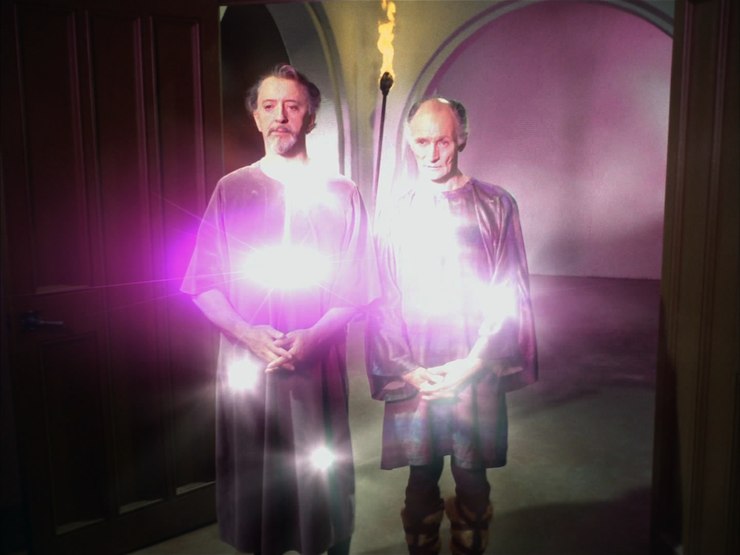
It becomes quickly apparent that the Organians’ humanoid form is a fiction, one to provide a point of reference for corporeal beings who might visit. In fact, the Organians are beings of pure energy who find the presence of such violent, emotional beings as the humans and Klingons to be disgusting. They force peace upon both nations, which embarrasses Kirk (he was so outraged that the Organians wanted to stop a war he never even wanted to fight in the first place) and disappoints Kor (who thought the war would’ve been glorious).
Fascinating. Spock poses as a merchant dealing in kevas and trillium and is sufficiently awesome that he can blow past the mind scanner.
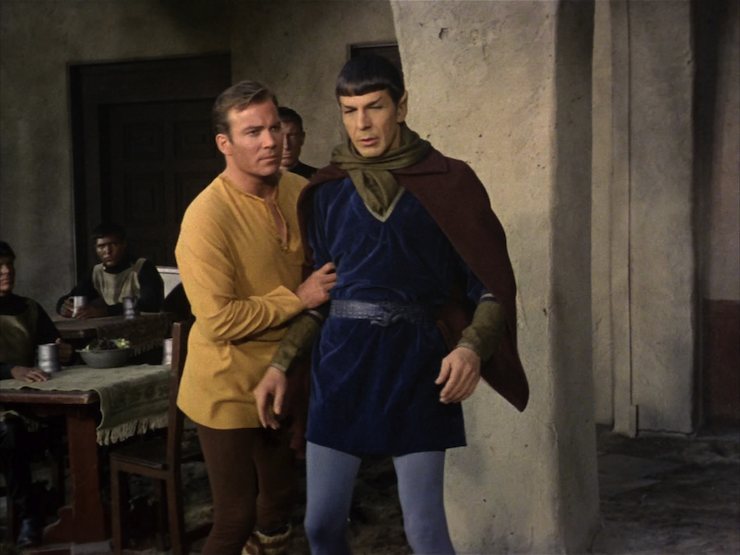
I’m a doctor not an escalator. This is the last episode of the series in which DeForest Kelley doesn’t appear.
Ahead warp one, aye. As with “Arena,” Sulu is left in charge of the ship in a battle situation. And as with “Arena,” he’s reluctant to not beam the landing party back up.
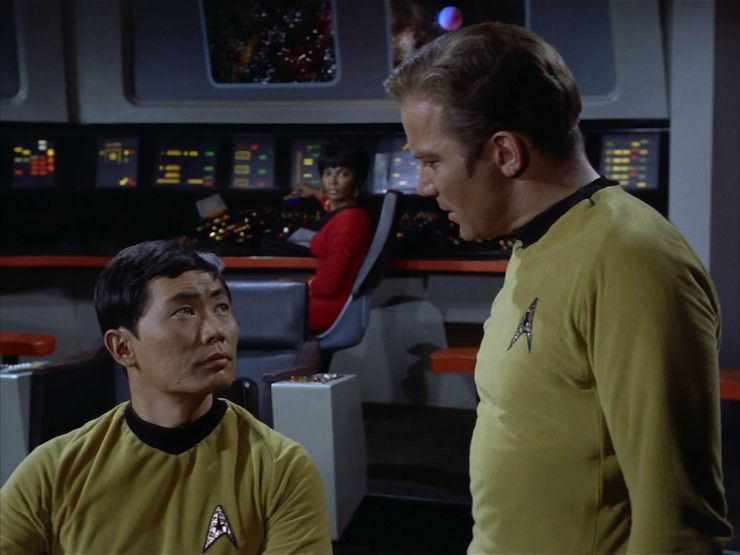
Hailing frequencies open. Uhura’s job in this one is bearer of bad tidings: that negotiations have broken down, that there’s a fleet in the area, and that war has broken out.
Channel open. “What would you say the odds on our getting out of here?”
“Difficult to be precise, Captain. I should say approximately 7824.7 to one.”
“Difficult to be precise?”
Kirk discussing the situation with Spock and ignoring Han Solo’s advice about odds.
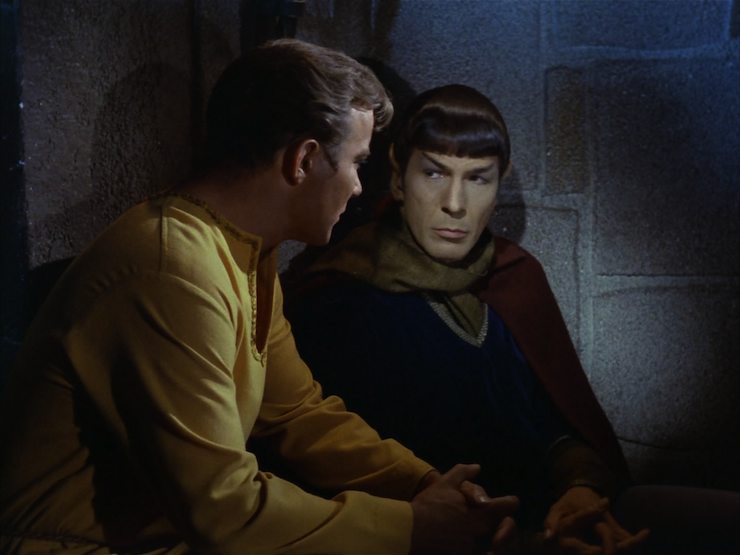
Welcome aboard. John Abbott, Peter Brocco, and David Hillary Hughes play the Organians, while Victor Lundin, Walt Davis, and George Sawaya play various Klingons. Plus we’ve got recurring regulars George Takei and Nichelle Nichols.
But the main guest is the great John Colicos as Kor, our first Klingon, and the man who set the tone for the species going forward. The character will return in the animated episode “The Time Trap” (voiced by James Doohan), and Colicos will return as a much older Kor on three DS9 episodes, “Blood Oath,” “The Sword of Kahless,” and “Once More Unto the Breach.”
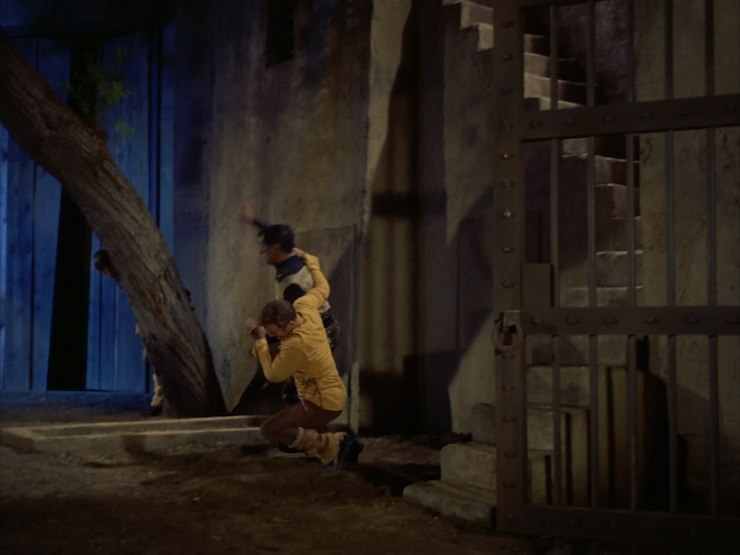
Trivial matters: This episode introduces an enemy of the Federation known as the Klingons. Always thought they should’ve done more with them…
But seriously, folks… The Klingons will become the most popular recurring antagonist for Kirk and the gang, showing up again in “Friday’s Child,” “The Trouble with Tribbles,” “A Private Little War,” “Day of the Dove,” “Elaan of Troyius,” and “The Savage Curtain” on the series, as well as the films The Motion Picture, The Search for Spock, The Voyage Home, The Final Frontier, The Undiscovered Country, and Star Trek Into Darkness, as well as playing important roles on all four spinoffs. Indeed, three of those spinoffs will have a Klingon in the opening credits.
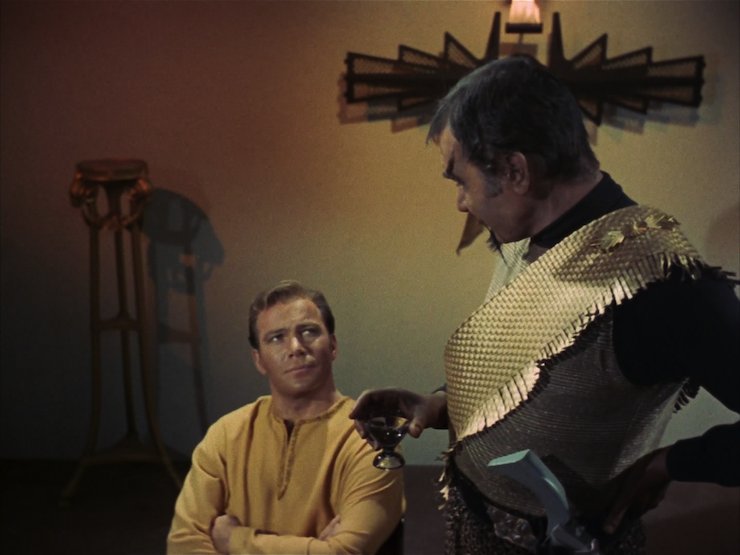
The lead-up to this war is seen in Kevin Ryan’s two trilogies Errand of Vengeance and Errand of Fury. The final book of the latter trilogy is a novelization of this episode, greatly expanding the events, including details of Sulu’s engagements while in command of the Enterprise.
Following this episode, peace between the Klingons and Federation will be managed via the Organian Peace Treaty, as established in “The Trouble with Tribbles.”
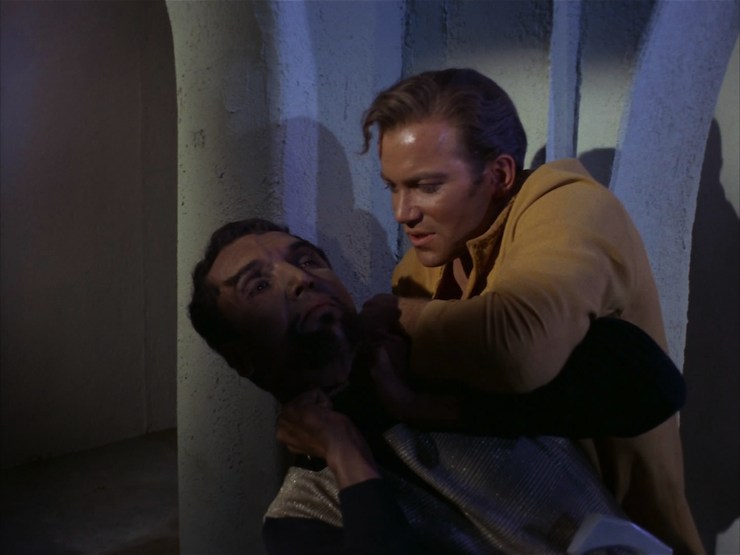
Ayelbourne’s assurance that the Federation and Klingons will become fast friends is seen in the 24th-century spinoffs, in which they are allies (save for a brief period during DS9‘s fourth and fifth seasons) catalyzed by the events of The Undiscovered Country. Apparently, Worf was specifically made into a bridge officer on the Enterprise for TNG in order to show that Ayelbourne’s prediction did indeed come true.
The Organians will be seen again in the Enterprise episode “Observer Effect.” They’re also seen in several bits of tie-in fiction, such as James Blish’s Spock Must Die!, the first four issues of DC’s first monthly Star Trek comic book by Mike W. Barr, Tom Sutton, and Ricardo Villagran, and The Q-Continuum trilogy by Greg Cox.
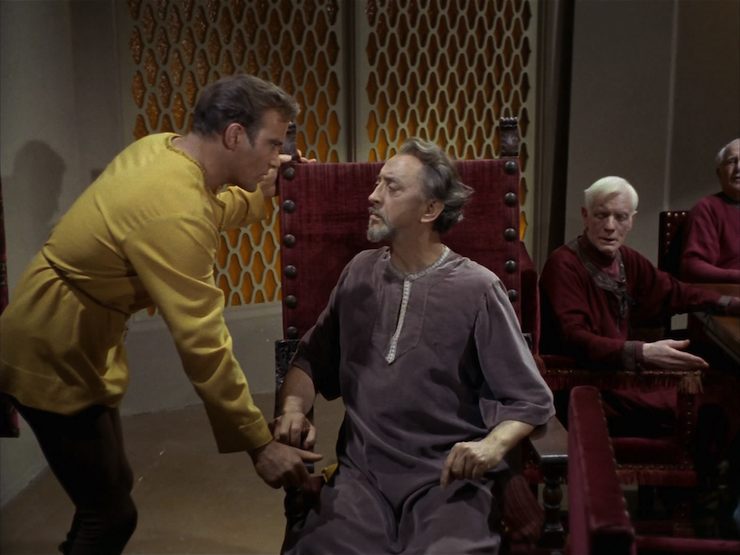
The episode’s title comes from The Life and Adventures of Nicholas Nickleby by Charles Dickens: “It is an errand of mercy which brings me here. Pray, let me discharge it.”
It had been intended to bring Colicos back as Kor in both “The Trouble with Tribbles” and “Day of the Dove,” but he was unavailable each time, and so different Klingons were substituted. An episode was written for Kor for the fourth season, but the show was cancelled.
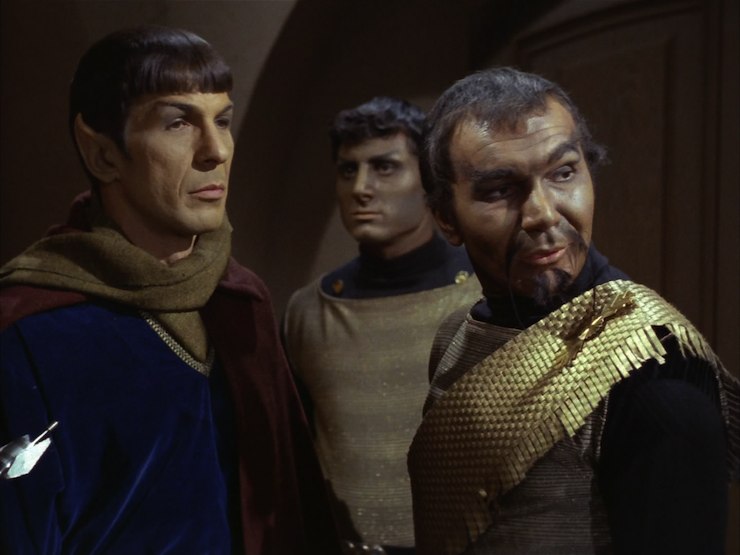
An issue of the Blood Will Tell comic book by Scott & David Tipton and David Messina told this story from the Klingon perspective.
Kor makes dozens of subsequent appearances in tie-in fiction as well, far too numerous to name here, but a few of them include the aforementioned Spock Must Die! as well as your humble rewatcher’s “The Unhappy Ones” in Seven Deadly Sins, The Tears of the Singers by Melinda M. Snodgrass, “Though Hell Should Bar the Way” by Greg Cox in Enterprise Logs, “The Leader” by Dave Galanter in Constellations, the graphic novel Debt of Honor by Chris Claremont, Adam Hughes, and Karl Story, The Centre Cannot Hold by Mike W. Barr (part of the Mere Anarchy miniseries), Forged in Fire by Andy Mangels & Michael A. Martin, and the TOS and DS9 installments of the Day of Honor miniseries (by, respectively, Dean Wesley Smith & Kristine Kathryn Rusch and L.A. Graf).
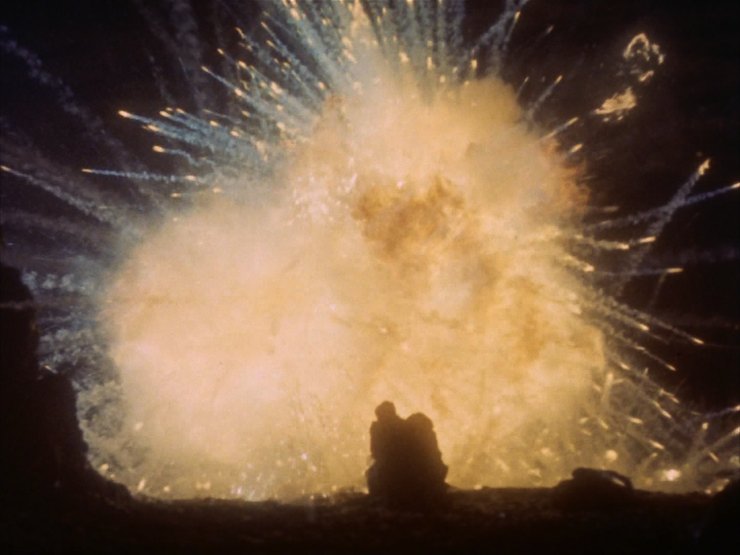
To boldly go. “It would have been glorious.” I am, of course, predisposed to like this episode, given the metric buttload of Klingon fiction I’ve written over the years, but even if we never saw the Klingons again, this would be a strong episode.
For starters, there’s Kirk’s frustration with the Organians, who seem utterly oblivious to the danger that awaits them, which William Shatner beautifully plays. Then there’s the Organians themselves. Watching the episode knowing the ending is even more entertaining, because when you’re aware that the Organians are beings of pure energy who mostly just want the noisy kids to get off their lawn, it makes it all the more delightful. Their behavior is actually very consistent with that, just wanting to be left alone but also wanting no one else to get hurt. You can see why Kirk and Kor don’t get it, though. Indeed, knowing the truth, Kirk comes across as hilariously self-righteous, arrogant, and naïve all at the same time when he offers medical, technical, and scientific help for the Organians alongside the military aid.
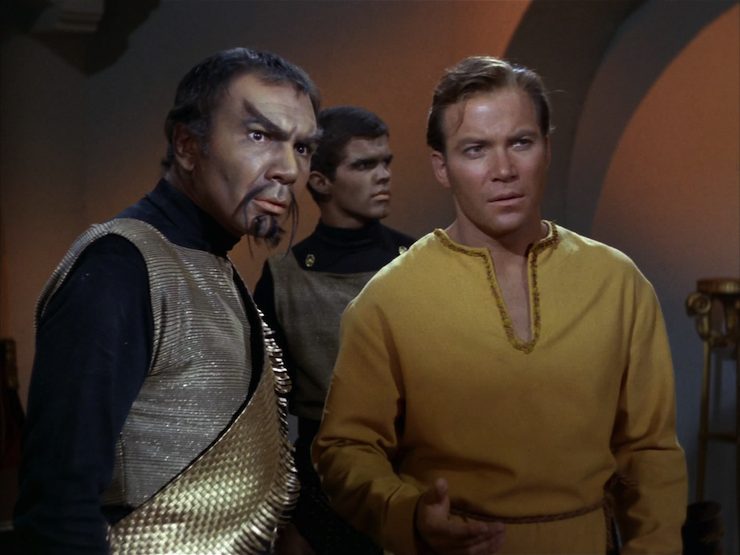
But the standout is, of course, John Colicos. There’s a belief among a segment of the Trek fan base that views the Klingons as changed significantly between the original series and the various spinoffs, that they went from being thugs to warriors, but that belief only works if you ignore the character of Kor. Colicos gives us the blueprint for every Klingon that came afterward, and everything from Worf’s tactical acumen on TNG and DS9 to the Kahless clone’s declarations of the joy of battle and combat in TNG‘s “Rightful Heir” to Martok’s dignity on DS9 can trace its roots back to what Colicos does in this episode.
And in the end, we have what has quickly become the trademark of a Gene Coon script: things are not what you think they are, and jumping to conclusions usually leads to you putting your foot in it.
Warp factor rating: 9
Next week: “The City on the Edge of Forever”
Keith R.A. DeCandido has written Kor several times and always loved it: in the Seven Deadly Sins anthology, in his Lost Era novel The Art of the Impossible, and in Enterprises of Great Pitch and Moment in the Slings and Arrows eBook miniseries.










